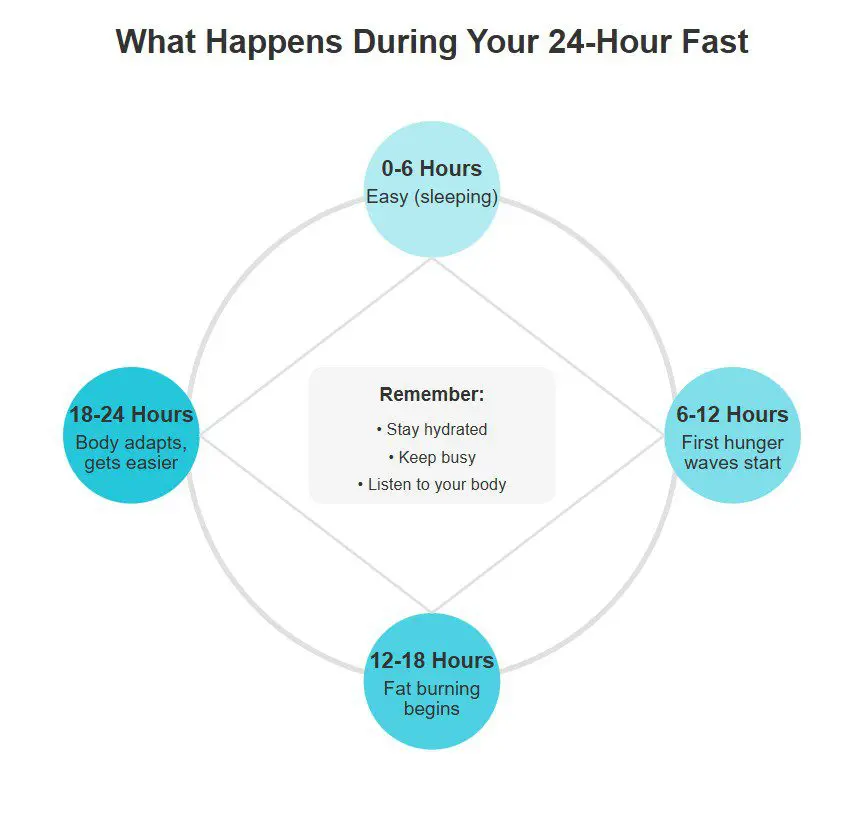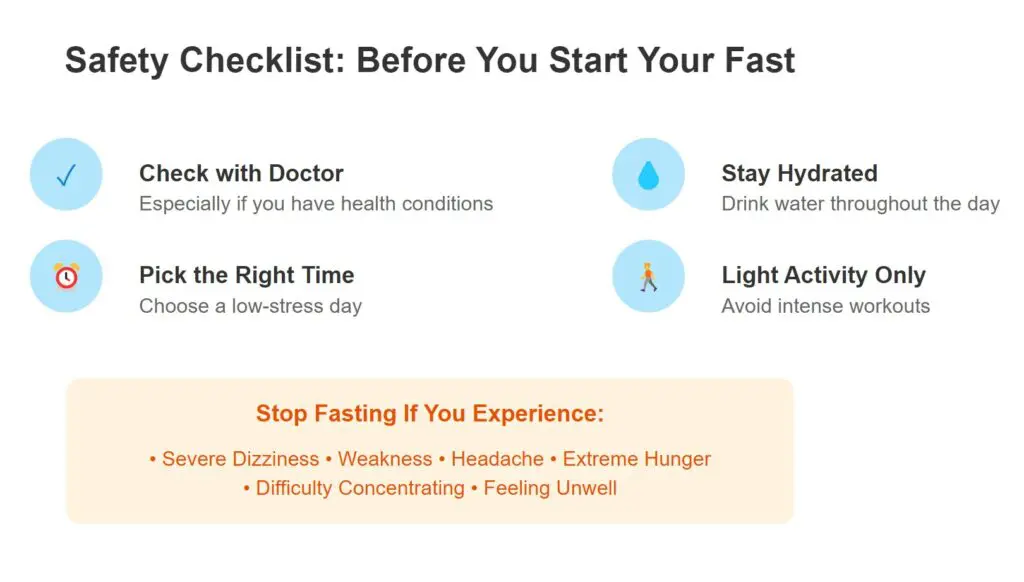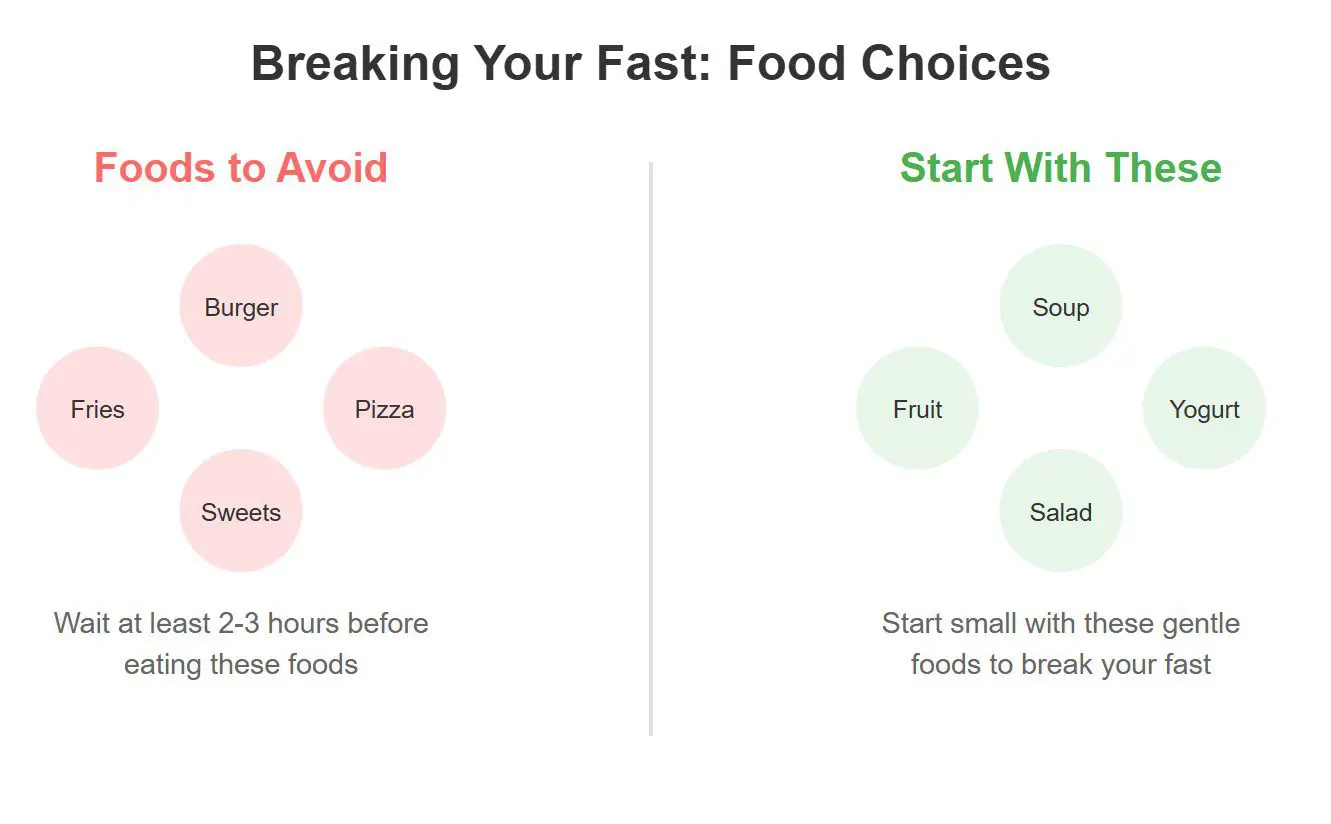Important Note: This article is for informational purposes only and is not medical advice. Always talk to your doctor before starting any fasting program, especially if you have health conditions or take medications. Your doctor can help you decide if fasting is safe for you.
Unlocking the Powerful Health Advantages of 24-Hour Fasting
Ever wondered what happens when you take a one-day break from eating? While it might sound a bit intimidating at first, fasting is becoming increasingly popular – and for good reason. From giving your body a chance to reset to potentially helping you live longer, the benefits of fasting for 24 hours are amazing. Let’s dive into what happens when you give your body this brief but powerful break from food.

What is Fasting | Benefits of Fasting | How to Fast | FAQs | Wrapping Up
What is Fasting and How Does It Work?
The Concept of Fasting
Think of fasting like pressing a reset button on your body. It’s simply taking a break from eating for a set period – in this case, 24 hours. While our ancestors might have fasted out of necessity (you know, when the hunting wasn’t so good), today we do it by choice to tap into some incredible health benefits.
How Fasting Resets Your Body
Here’s something cool: your body is like a hybrid car – it can run on different fuel sources. Usually, it burns glucose (sugar) from the food you eat. But when you fast, it switches to burning stored fat for energy, kind of like switching from regular gas to a backup power source. This switch happens around 12-16 hours into your fast, and that’s when the magic starts to happen.

Key Benefits of Fasting for 24 Hours
Weight Management and Fat Loss
Impact on Metabolism
During a fast, your body becomes a fat-burning machine. Your metabolism speeds up (by up to 14% in some studies) rather than slowing down like many people fear. This happens because your body releases norepinephrine, a hormone that helps you burn more calories even when you’re just sitting around.
Hormonal Responses to Fasting
Your hormones get a major tune-up during a fast. Insulin levels drop dramatically, which is like opening the gates to your fat stores. Meanwhile, human growth hormone levels can shoot up to five times their normal amount. This helps preserve your muscles while your body burns fat for fuel – neat, right?
Enhancement of Cellular Repair Processes
Autophagy and Its Role During Fasting
Here’s a fun fact: your body has its own cleaning crew! This process, called autophagy, kicks into high gear when you fast. Think of it like your body’s spring cleaning – getting rid of old, broken-down cell parts and making room for new, healthy ones. Just like you might clean out your closet to make space for new clothes, your body cleans out damaged cells to keep everything running smoothly.
Renewal of Cells and Tissues
Research shows that fasting can trigger stem cell production, helping your body repair and replace damaged cells. It’s like giving your body a chance to do some spring cleaning and home improvements all at once.
Long-Term Immune Health Benefits
Regular fasting can help reduce chronic inflammation, which is linked to many diseases. Think of inflammation like a low-level fire in your body – fasting helps put it out, giving your immune system a chance to work more effectively.
Improved Insulin Sensitivity
How Fasting Affects Insulin Levels
Remember how we talked about insulin dropping during a fast? Well, this break from constant insulin production helps your cells become more sensitive to it when you do eat. It’s like taking a break from listening to loud music – when you turn it back on, you can hear it much better.
Benefits for Blood Sugar Control
Better insulin sensitivity means better blood sugar control. After a fast, your body becomes more efficient at processing carbohydrates and managing blood sugar levels. Studies show that regular fasting can reduce fasting blood sugar and insulin.
Increase in Mental Clarity and Cognitive Function
Neurological Benefits of Fasting for 24 Hours
Ever notice how some of your best thinking happens when you’re not worried about your next meal? That’s because fasting may increase the production of BDNF, a protein that acts like fertilizer for your brain cells. Many people report feeling more alert and focused during a fast, especially after the initial hunger pangs pass.
Fasting and Mental Health
Fasting isn’t just good for your body – it can help your mind too. Regular fasting has been linked to reduced anxiety and depression symptoms in some studies. Plus, it can help you develop a healthier relationship with food by showing you the difference between true hunger and emotional eating.
How to Safely Fast for 24 Hours

Preparing for a 24-Hour Fast
What to Do Before You Begin
Start your fast after a balanced, satisfying meal. Good options include:
- A big salad with grilled chicken and avocado
- Salmon with sweet potato and vegetables
- A hearty vegetable soup with beans and whole grains
Also, pick a convenient time – many people find it easiest to start after dinner and fast through the next day until dinner time again.
Essential Nutrients and Hydration
During your fast, you can and should have:
- Water (aim for 2-3 liters)
- Black coffee or plain tea
- Sugar-free electrolyte drinks if needed
- A pinch of salt in water if you’re feeling dizzy
During the Fast: What to Expect
Common Physical and Emotional Responses
Hour by hour, here’s what you might experience:
- Hours 0-6: Pretty easy (you’re sleeping)
- Hours 6-12: Initial hunger pangs
- Hours 12-18: Energy fluctuations
- Hours 18-24: Usually easier as your body adapts
Tips to Manage Hunger and Energy Levels
- Stay busy with work or hobbies. Read about some fun, stress-relieving activities you could try.
- Take a walk when hunger hits
- Try meditation or light yoga
- Take a nap if you need to
- Remind yourself it’s temporary
Breaking the Fast: Best Practices

Foods to Reintroduce After Fasting
Your stomach is more sensitive after a fast, so start with light foods. Think of it like warming up before exercise – you want to start slow.
Good first foods include:
- A piece of fruit with a handful of nuts
- A small, gut-soothing smoothie made with berries and yogurt
- Light vegetable soup
- A small salad with a palm-sized portion of chicken

Foods to avoid at first:
- Large meals
- Greasy or fried foods
- Spicy dishes
- Heavy proteins like red meat
Wait about an hour before having a regular-sized meal.
How to Maintain the Benefits of Fasting
The key to getting the most from fasting is making it a regular habit. Here’s how:
Pick a schedule that works for you:
- Start with one fast per month
- Work up to every other week
- Eventually try once per week if it feels right
Between fasts:
- Eat regular, balanced meals
- Stay hydrated
- Keep exercising
- Listen to your body
Remember: fasting is a tool, not a quick fix. The real benefits come from making it part of a healthy lifestyle.
FAQs About the Benefits of 24-Hour Fasting
Will I lose muscle if I don’t eat for 24 hours?
Don’t worry – your muscles are safe during a 24-hour fast. Your body is smart and will burn fat instead of muscle for energy. This happens because fasting triggers your body to release special hormones that protect your muscles. Just remember to stay active and eat enough protein on your non-fasting days.

Can I work out while fasting?
Yes, but keep it light. Good activities during a fast include:
- Taking a walk
- Stretching
- Easy yoga
- Light housework
Save the hard workouts, like running or lifting weights, for days when you’re eating normally. If you start feeling dizzy while exercising, stop and have something to eat.
Will fasting slow down my metabolism?
The opposite happens. When you fast for 24 hours, your metabolism speeds up by 3-14%. Think of it like your body turning up its internal furnace to burn stored fat for energy. This boost can last for up to two days after you start fasting. Just don’t fast for too many days in a row, or your metabolism might slow down to save energy.
How often is it safe to do a 24-hour fast?
Once you’re used to fasting, it’s safe to do it twice a week. But start slow. Here’s a beginner-friendly schedule:
- First month: Try it once
- Second month: Try it every other week
- After a few months: Up to twice a week, with 2-3 normal eating days in between
Listen to your body – if you feel weak or unwell, take more breaks between fasts.

Wrapping Up: Is a 24-Hour Fast Right for You?
Summary of Benefits
Let’s recap what a 24-hour fast can do for you:
- Helps burn fat while protecting muscle
- Gives your cells time to repair and clean up
- Makes your body better at using insulin
- Boosts brain power and focus
- Strengthens your immune system
Personal Considerations and Health Implications
While the benefits of fasting for 24 hours can be great, fasting is not for everyone. Skip fasting if you:
- Are pregnant or breastfeeding
- Have a history of eating disorders
- Have diabetes (unless your doctor says it’s okay)
- Are under 18
- Take medications that need food
Remember, fasting is like any other health tool – it works differently for each person. Start slow, listen to your body, and adjust as needed.
Have you tried fasting before? We’d love to hear about your experience. Share your thoughts in the comments below, and don’t forget to subscribe to our newsletter for more healthy living tips and tricks. Together, we can build better, healthier habits one day at a time!
More from Bananomad
- New to train travel? Our guide to fall foliage train rides covers everything: choosing routes, packing tips, and rookie mistakes.
- Find out what science says about picking the best HRV monitor. Learn which features matter and how to spot accurate heart tracking devices.
- Winter is coming. Learn to create a DIY homemade car emergency kit with 10 items in our easy guide.


Leave a Reply